#tng Encounter at Farpoint part 1
Explore tagged Tumblr posts
Text

s t a r t r e k t h e n e x t g e n e r a t i o n created by gene roddenberry Q [encounter at farpoint, s1ep1]
'Thou are notified that thy kind hath infiltrated the galaxy too far already. Thou art directed to return to thine own solar system immediately.' - q
#star trek#star trek the next generation#the next generation#gene roddenberry#star trek characters#tng character#Q#john de lancie#tng season 1#the next generation season 1#tng Encounter at Farpoint#Encounter at Farpoint#tng Encounter at Farpoint part 1#Encounter at Farpoint part 1#lot: st tng season 1 ep 1/26 (ep 1/178)#star trek quotes#latest tng posts
11 notes
·
View notes
Text
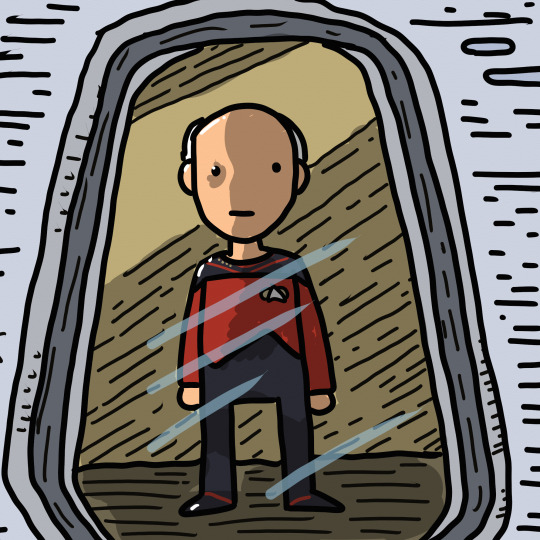

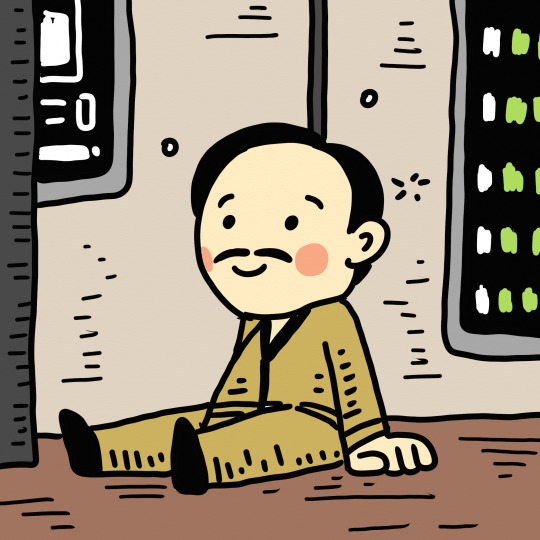
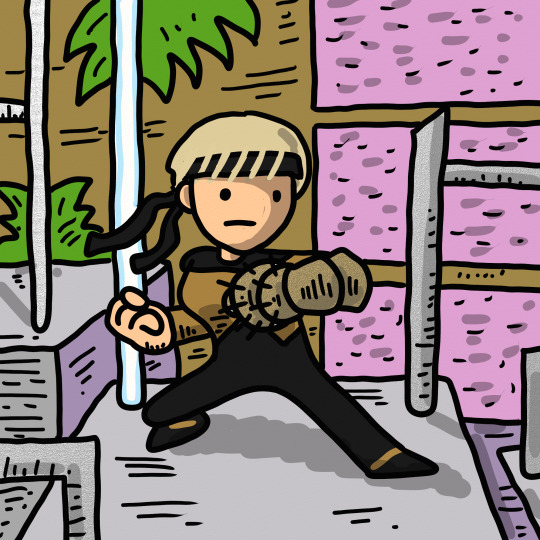

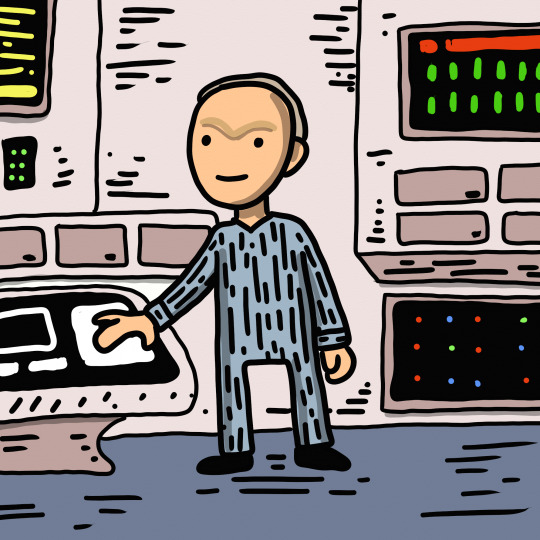
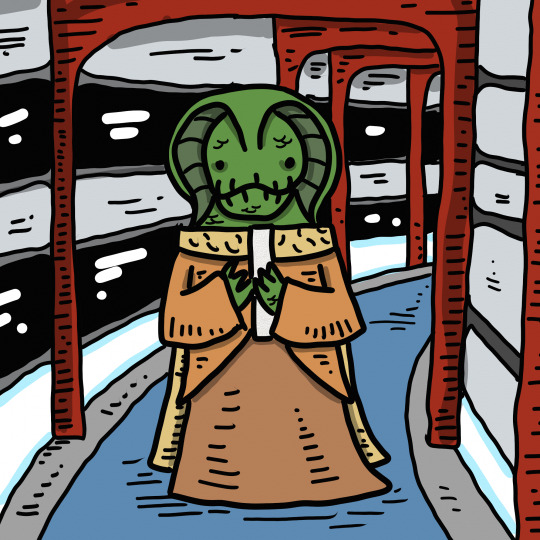

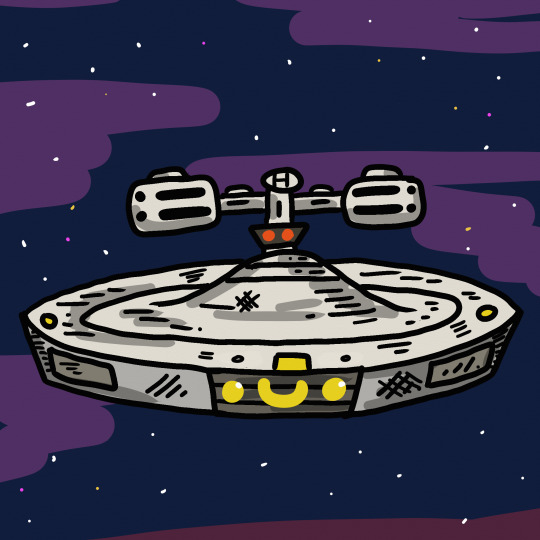


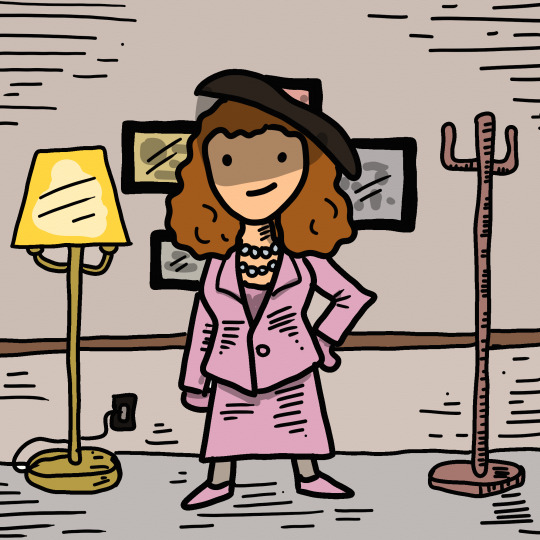

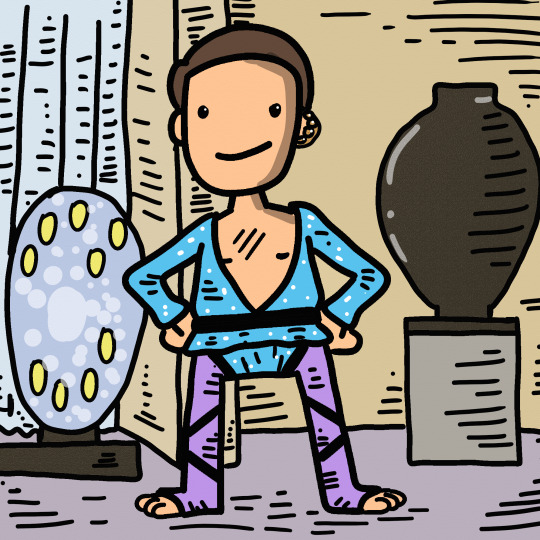
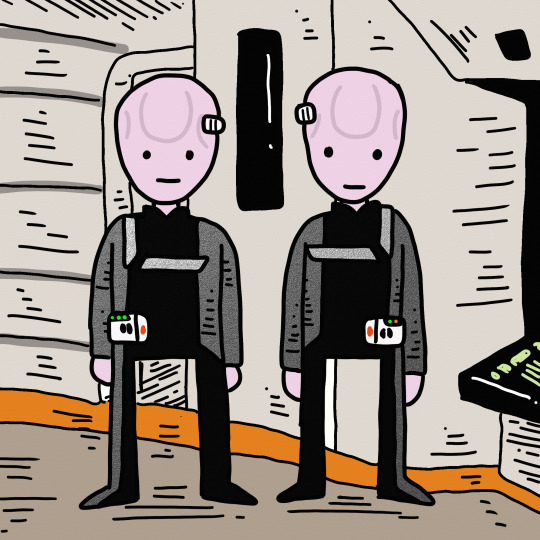

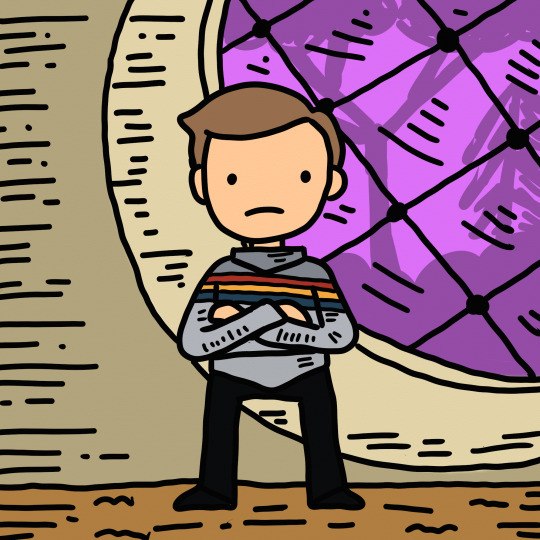

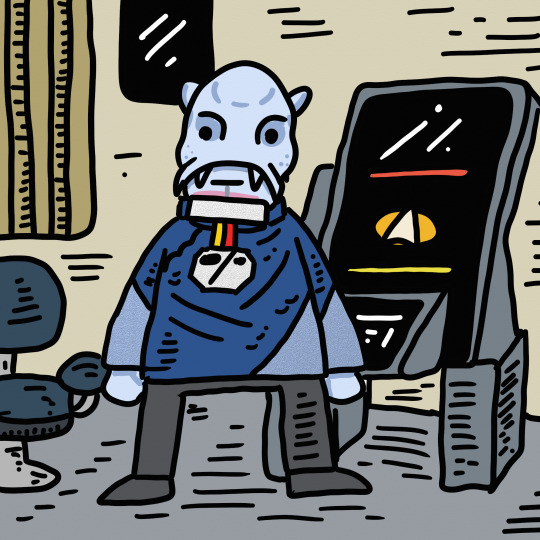

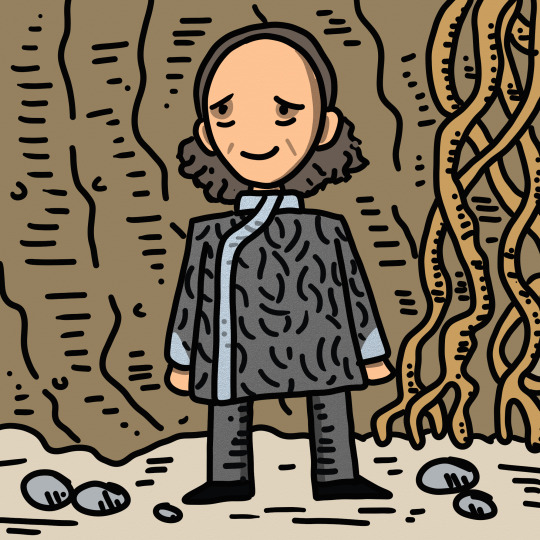

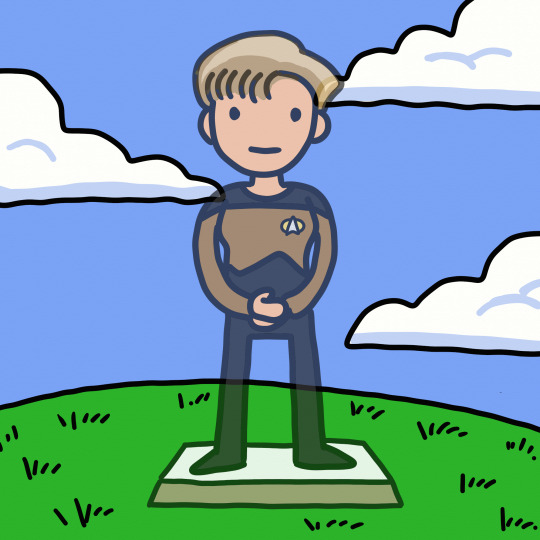

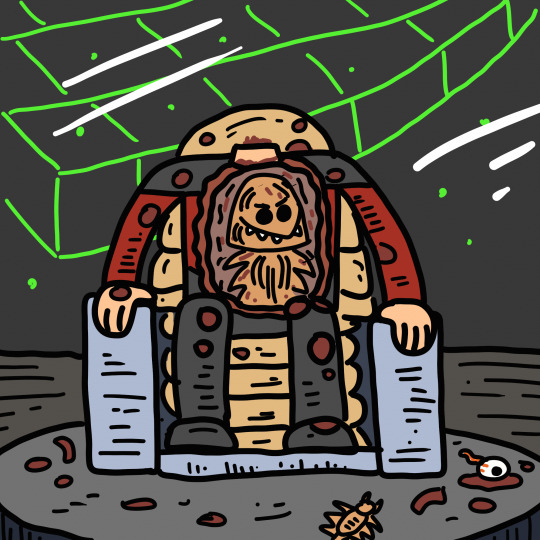

Li'l TNG - Season One
Encounter at Farpoint (Part 1 & 2)
The Naked Now
Code of Honor
The Last Outpost
Where No One Has Gone Before
Lonely Among Us
Justice
The Battle
Hide and Q
Haven
The Big Goodbye
Datalore
Angel One
11001001
Too Short a Season
When the Bough Breaks
Home Soil
Coming of Age
Heart of Glory
The Arsenal of Freedom
Symbiosis
Skin of Evil
We'll Always Have Paris
Conspiracy
The Neutral Zone
#star trek#drawing#star trek the next generation#star trek tng#tng#picard#crusher#worf#riker#geordie#data#wesley#tasha yar
505 notes
·
View notes
Text
From "Broken Bow" to "Calypso"
Since 2010, I rewatch all of Star Trek every five years during that calendar year.
Obviously since 2017 this has become an increasingly daunting task.
Usually I'd start with TNG + those movies then do DS9 --> Voyager --> Enterprise and end with ToS and the movies. Since 2015 I did the TNG/DS9/Voyager by stardate instead of full series. (Which means mixing episodes the last 2 seasons of TNG and first 2 of DS9 together, and the same for the last 5 DS9 + first 5 Voyager)
This time, I decided to do the entire universe by stardate.
Which means yesterday I started with Enterprise, Broken Bow.
Honestly I think starting with Enterprise is going to mean the first four dozen episodes are going to make it a bit rough of a beginning. But, I've been wanting to do the complete Stardate rewatch for a long time.
And also I forgot Broken Bow is double-sized premiere, like most of the series start out with a double sized episode, so I only made it through half last night and half today.
According to this list, which includes the movies and Short Treks, there are 897 episodes of Star Trek. But was last updated a year or so ago so it doesn't include the latest/final seasons of Prodigy (20 episodes), Discovery (10 episodes) or Lower Decks (10 episodes), nor the upcoming Section 31 movie or Strange New Worlds (10 episodes), so that's more like 948 episodes to get through.
*edit* Oh, it also put all 3 Kelvin movies on one line. So we're looking at an actual 950 "episodes".
(Not going to think about Starfleet Academy or Tawny's resort planet project, though those could happen before I make it there, too, since both will happen relatively late in the stardate order, but would be added in.)
Which means I'd have to watch an average of about 3 a day to get through all in a year.
For TAS, Short Treks, Prodigy and Lower Decks, that's easy.
But there's... what like 15 movies (including the Kelvin movies!) to get through in there, too, and this list counts double episodes like Encounter at Farpoint and Broken Bow as one episode.
Also, I paused keeping up with Robert Duncan McNeil & Garett Wang's Delta Flyers podcast when they started doing DS9 with Terry and Armin because I realized since it'd been 4 years or so since I'd watched any DS9 episodes that I wanted to rewatch as I listened/watched the podcast. When I get to the DS9 part of the rewatch it's going to be watching an episode or two then catching up on the podcast along with it, and Delta Flyers episodes (unlocked on the patreon) are often close to two hours long.
So yeah, I may turn this into a 2 year project now instead of 1. I may also want to re-listen to some of the Delta Flyers episodes when I watch Voyager, which, the first 5 seasons will also be mixed in with DS9 anyway.
There's other shows I want to watch besides about 950 episodes of Star Trek, too. So I'm going to commit to one episode a day of hour-long Trek and two of animated Trek and who knows how long the DS9/Voyager bit might take. I'll more than likely be ahead of that timeline most of the time, but then the Great DS9 Slowdown will happen so... I might even it out by then.
I'll give myself 2 years to get it done, that's more than doable.
Some of the watching will probably be more background noise while I'm working or doing other things. I've seen every episode of 1960's - 2000's (Enterprise) era trek at least 4 times each, many of them many more times, some TNG episodes I've probably watched closer to 20 times, (as a teen, any Wesley Crusher episodes got heavy VCR rotation time, OK?) so unless it's one I'm really looking forward to, they probably won't always get my full attention.
---
Also I have a ton of Star Trek novels which I've never read. I also own original copies of the first 30 or 40 TNG novels from the 80/90's when I would buy them with my allowance, so I may re-read some of those for the first time in 35ish years, and I think it'll be time for readthrough #3 of Kristen Beyer's Voyager novels pretty soon, too to get my J/C fix in.
First up, I want to read all of the post-Enterprise "Trip lives!" novels in the next year or two. I've read The Good That Men Do, which brings Trip back, and loved it, so I'm planning on making some reading time in the next few months as well.
---
So hey, I'll probably make some commentary about it all here on tumblr along the way.
Add "annakie's star trek stuff" to the blacklist if you don't want to ever see anything about this ever again.
3 notes
·
View notes
Text
WHY WE LOVE "MON CAPITAINE"
We've all heard Q call Picard "Mon capitaine" throughout Trek canon and in written lore. This is SO significant because
1. It's a very special term of affection, respect, AND connection for Q to use with Picard. Affection/love are motivations, of course, as to why Q calls Picard that nickname, but it's also a form of connection with him.
It is true that lovers and family members give one another nicknames as a way of creating an exclusive bond between them. As with Qcard, who else does Q call "Mon capitaine"? Does Q have an affectionate term he often and deliberately chooses to use both publicly and privately to call anyone else?
2. The fact that out of all things he could have called Picard, Q chose "Mon capitaine." This nickname was chosen from the very beginning in the TNG series pilot, Encounter at Farpoint, and used all the way through TNG to Star Trek Picard. It's amazing that Q, who was in such an antagonistic role in Farpoint, gave Picard a nickname that denoted an appreciation for Picard's French culture--an appreciation for *who Picard was*. The use of "Mon capitaine* is PERSONAL.
And to think that Q tapped into that cultural vein leading to Picard by using a French battle camp set and uniform in Hide n' Q, and then later choosing to speak French to other people in other series when Picard wasn't even around!
It all shows an enduring love for Picard and devotion to him by finding appreciation for his culture. In a small way, Q adopted the French culture as part of his own. Isn't that what we do when we love someone? We explore, and sometimes adopt their interests? If it's important to them, it can be important to us.
3. Finally, what does Mon capitaine mean? My captain, of course. But, as we see Q's feelings for Picard grow and develop, it is definitely MY captain. Picard doesn't belong to anyone else.
It's the psychology of nicknames. Who else could be Q's capitaine?
Picard and his crew may have felt Q was merely mocking Picard by calling him that, but really, when we think about it, it's a claim on Picard, a personal link between Picard and himself.
It's also a surface hint to the love that Q feels for Picard, and the relationship they share.
42 notes
·
View notes
Text

The USS Enterprise-D separated its saucer section four times on screen: 1. Encounter at Farpoint (TNG S1E1-2) 2. The Arsenal of Freedom (TNG S1E21) 3. The Best of Both Worlds, Part II (TNG S4E1) 4. Star Trek: Generations (1994 movie) Credit: Tiberius Jim #StarTrek #GalaxyClass http://dlvr.it/TBMRTX
0 notes
Text
Reviewing Star Trek TNG - S1E1 “Encounter at Farpoint”
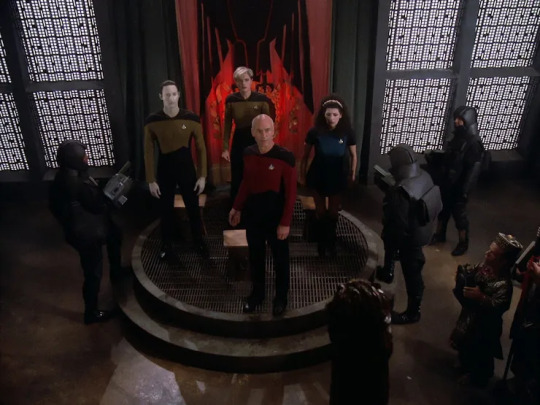
So… you’re probably wondering why I’m only doing this now. Well, some of you may remember that this originally started as “reviewing every TNG episode I haven’t seen before,” similar to my early TOS reviews, but I quickly realised that was redundant because that applied to nearly all of them. So I just made it a proper review series.
Unfortunately this decision came after I skipped the season premiere. I’ve been meaning to rectify this for a while now, and what better time to do it than between the series' most infamous cliffhanger?
Let's just pretend I posted this back in February, okay? Just ignore the fact that the reviews for the subsequent episodes are going to look a lot worse in comparison. I could just edit those reviews or just re-review those episodes entirely, but…

And yes, I'm treating this as one review, since this was originally aired as a single feature-length episode and was only split into parts for reruns. That's why this took so fucking long.
So join me way back in season 1, when Riker's face was shaved, Wesley Crusher was merely an irritating child and I still had hope that Tasha Yar was going to get any sort of character development.
THE PREMISE
In the year 2364, the Federation's newly-built flagship, the USS Enterprise-D, is embarking on its maiden voyage under the command of Captain Jean-Luc (pronounced zhon-luke) Picard. Their first mission is to travel to the planet Deneb IV to examine the mysterious Farpoint station, which the Bandi species is offering to the Federation.
Suddenly the ship is surrounded by a massive force field, and a mysterious figure appears on the bridge, calling himself Q (John de Lancie) and warning them not to go any further.
MEET THE CREW

A lot of this episode is just character introductions, so I thought I'd save some time and just get it all out of the way here, even though this is probably one of the most famous casts in all of popular culture, and most of them are kinda just... there in this episode.
From left to right:
Wesley Crusher (Wil Wheaton) - The son of Doctor Beverly Crusher, who has been raised by his mother since the death of his father on an away mission led by Picard.
Lieutenant Tasha Yar (Denise Crosby) - The ship's tactical officer and chief of security.
Lieutenant Geordi La Forge (LeVar Burton) - The ship's helmsman, who is blind and depends on his visor to see.
Commander William Thomas "Will" Riker (Jonathan Frakes) - The ship's newly-promoted first officer.
Captain Jean-Luc Picard (Sir Patrick Stewart) - The Enterprise-D's commanding officer.
Doctor Beverly Crusher (Gates McFadden) - The ship's chief medical officer.
Lieutenant Worf (Michael Dorn) - A Klingon junior officer who carries out several miscellaneous roles on the bridge.
Lieutenant Commander Deanna Troi (Marina Sirtis) - The ship's half-human, half-Betazoid empathic counsellor. She and Riker are basically better-developed versions of Decker and Ilia from The Motion Picture.
Lieutenant Commander Data (Brent Spiner) - An android created by the late Doctor Noonien Soong who serves as the second officer and operations officer.
MY REVIEW
At the time, this was the first completely original Star Trek property in almost twenty years... and to be honest, it kind of shows. Because everything feels very rough around the edges.
Case in point, the episode's inciting incident happens almost immediately after Picard's bland introduction - standing in front of an ugly wooden background then heading up to the bridge while his voiceover gives us exposition. This episode is 90 minutes long and yet it's already racing off before it's even tied its shoelaces, even going to a commercial break less than ten minutes in.
Fortunately, John de Lancie is already having a blast as Q, who changes through many costumes from human history as he calls out humanity as a savage and childish race, living through the same destructive cycle throughout history.

Picard of course protests, and Q disappears after some cryptic warning about how they'll be judged and prosecuted per Picard's "suggestion."
As an alternative, Picard attempts to outrun Q at maximum warp, pushing the ship to its limit while Dennis McCarthy's music tries to convince us that this is more exciting than it actually is.
They're of course unable to escape, and Picard (rather abruptly, in my opinion) decides to separate the ship's saucer section. Worf (who is never even named in this episode) is given control of the saucer, while Picard and his senior crew (which at this point is just Yar, Troi and Data) retreat to the set of Star Trek 3, which is apparently the ship's battle bridge.
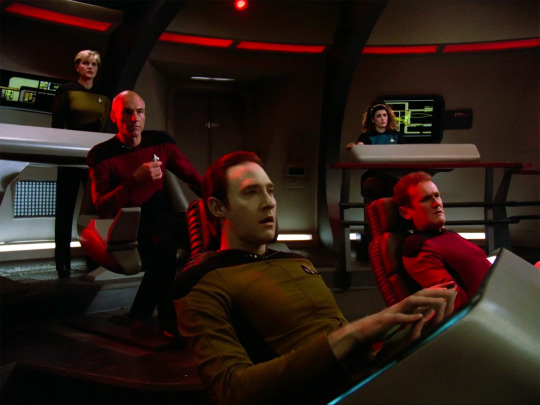
If you ever feel incompetent, remember that somebody looked at Data and O’Brien slouched down in their chairs and decided that setup was good enough to keep for an entire season.
The episode decides that the separation is apparently exciting enough to warrant a replay of the theme song, and the two sections part ways.
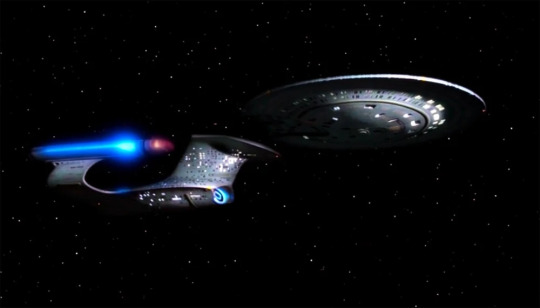
You can probably count the number of times this'll happen on one hand, but it's apparently a thing they can do now. For some reason.
It quickly becomes clear that the star drive section (the bit on the left) is just a distraction for the saucer to get away, as Picard surrenders to Q's terms, a move so unexpected that Troi starts tearing up when the order is given.
I believe their intent was to have Troi physically emulate whatever emotion she was sensing, which I guess makes sense with her being an empath, but it was pretty much dropped entirely after this.
Bloody hell, this whole thing reads like a first draft.
They're surrounded once again, and the senior crew find themselves transported to a court of the late 21st century (2079 to be specific), with Q as the judge. It becomes clear that they've been put on trial to answer for the crimes of humanity in a kangaroo court.

Fortunately this leads to another character getting some damn personality, with Yar knocking out a guard and making it clear that she's having precisely none of Q's bullshit.
Picard: Tasha, no!
Yar: I must! Because I grew up in a world that allowed things like this court! And it was people like these that saved me from it! This so-called court should get down on its knees to what Starfleet is! What it represents!"
Sure, she's immediately frozen for it, but I can appreciate the effort. Just like I can appreciate this script for trying to give her some actual development.
After some more courtroom chicanery where Picard continues to plead not guilty, the guy filming Patrick Stewart's closeups forgets to fully uncover the camera lens and Data shows an ability to mimic people's voices which he subsequently never uses again, Picard proposes that Q test the Enterprise crew, to which Q agrees and transports them back to the battle bridge, where I guess a yet-unnamed O'Brien had just been waiting this whole time.
Suddenly we cut to Commander babyface Riker, who is already at Farpoint station. He's meeting with Bendi administrator Groppler Zorn (which is perhaps the most sci-fi name I've ever heard) for a scene which doesn't really serve much of a purpose except to establish that the station is supposedly too good to be true and that the Bendi is working with some mysterious force that can make objects appear from thin air.

Get you a man who looks at you the same way Riker looks at those apples.
To any writers reading this, this is what we call "showing your hand too early." The whole idea of a mystery is that someone can't work out the whole thing a third of the way through.
We get a few more character introductions (Dr Crusher, Wesley, Geordi - who also isn't given the courtesy of a name), Riker beams up to the ship to be briefed, then the two ship sections are rejoined. Riker has to oversee the rejoining manually, in an interesting little dynamic where Picard tests Riker's potential and Picard finally gets some development as a captain whose need to maintain his reputation makes him emotionally closed-off.
We also get a nice scene where Data escorts an elderly Admiral McCoy (once again played by DeForest Kelley) onto a shuttlecraft.
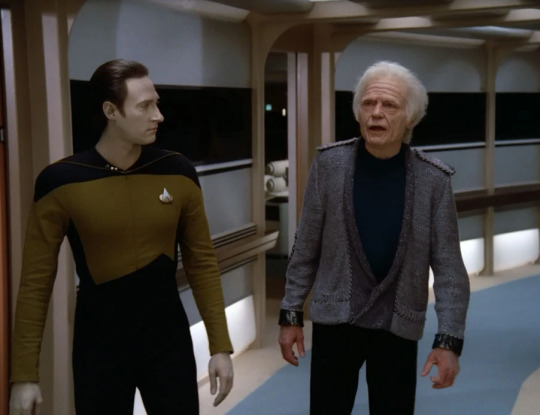
I realise that this was probably only added to pad out the runtime, but I'm glad it was included. It feels like McCoy is passing the torch to the next generation in a scene which Kelley did for minimum pay as a favour to Gene Roddenberry.
Plus it's not like this is the first time he's interacted with the TNG crew.

Sometimes you find the greatest things when you're combing through behind the scenes pictures.
Anyway, speaking of padding out the runtime, Q shows up again to inform them that they only have 24 hours before final judgement.
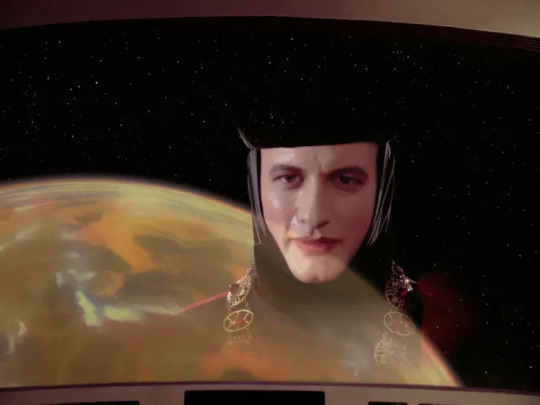
The reason I'm mostly going over the plot in broad strokes instead of covering it beat-to-beat is because a lot of it just isn't terribly interesting. The original plot only focused on the mystery surrounding Farpoint station, but Paramount insisted on making this a double episode, so the subplot about Q (among other things) was added to pad out the script.
That's right. The most memorable part of this episode and one of the best characters in the entire franchise was never meant to be exist in the first place. That bodes well for the rest of the plot.
Back in the "main" plot, an away team finds some tunnels under the station, which Data analyses.
"Sorry, sir. I seem to be commenting on everything.”
That’s okay, Data. Just throw in the odd bad joke or snarky comment and a bunch of strangers will give you internet points.
...Did I say that out loud?
Anyway, that scene doesn't really go anywhere before the Enterprise encounters a generic-looking ship that attacks the Bandi city.
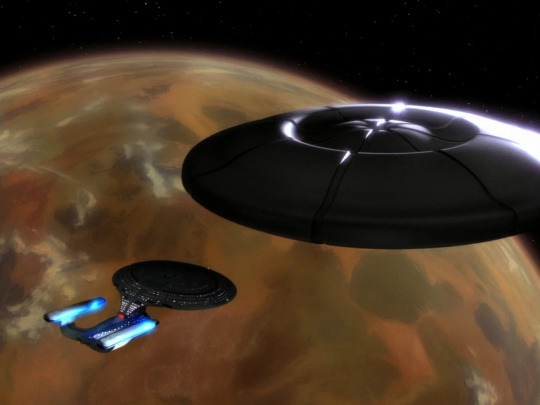
Meanwhile, Q reappears to provide some much-needed tension, trying to goad Picard into attacking the ship, violating the Prime Directive and proving humans to be the savages he accuses them of being.
Their attempts to find Zorn and get some answers prove fruitless when he phases out of existence, and they have no choice but to beam over to the ship, which is apparently a sentient being. Its corridors are identical to the ones beneath Farpoint, as well as Zorn being tortured.
Just when it seems that Picard will have to fold to Q's demands, the away team is beamed back to the Enterprise. Picard (and the writers) finally realise the truth, and we get our big explanation.
The Bandi have somehow captured an alien life form and have constructed Farpoint Station (as well as anything they want) by feeding off its power. The mysterious ship is actually the life form's mate which has come to free it. Not really sure how it assumed the form of a ship and how it simulated the weapons, but okay.
The Enterprise blasts Farpoint to oblivion, freeing the land-locked alien and allowing them to fly off as a happy pair of space jellyfish.

Because they've solved the mystery, I guess that means that the deal with Q is off. It's here where it becomes obvious that he was never meant to be part of the plot.
Picard: Get off my ship!
Q: I do so because it suits me to leave. But I do not promise never to appear again.
Please hurry back.
With the mission over, we get the usual denouement of the crew settling in to their new roles and setting the stage for the rest of the series.
"Let's see what's out there. Engage!"
Roll credits.
As you can probably guess, I have mixed feelings about this episode. The whole Farpoint mystery is… adequate but nothing special, and it’s difficult to give Q and his subplot any credit when you learn that it was essentially a happy accident. A pilot is supposed to be about putting your best foot forward, but having viewed the rest of this season I suppose it is representative of the series’ initial quality.
Yeah, I’m actually doing some reviewing for once instead of just going through the plot and making jokes. I’m surprised too.
It isn’t offensively bad like some of the other episodes in this season, but if I didn’t already know that the series got better after this then I genuinely don’t know if I would keep going from here.
6/10 - A decent enough start, I suppose.
And now my review list is finally up-to-date.
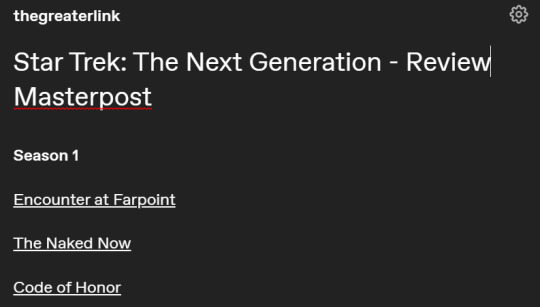
I can't wait for people to stumble upon the review masterpost and get confused when the review quality fucking plummets in the next one.
Speaking of which:
TNG Masterpost | Next Episode
#star trek#star trek tng#star trek the next generation#jean luc picard#captain picard#uss enterprise#will riker#geordi la forge#beverly crusher#shut up wesley#wesley crusher#tasha yar#deanna troi#star trek worf#star trek data#miles o'brien#star trek q#john de lancie#pilot episode#season 1#star trek review
14 notes
·
View notes
Text
TNG Guide: Picard/Crusher Edition
Someone did a guide like this for Elliot and Olivia from Law and Order and I’ve been thinking about these two lately so here we are.
This guide is obviously coloured by my personal opinion and some of the things are really subtle, but there’s also way less to get through here than something like SVU.
Of course, there are still many good episodes of TNG that don’t revolve around Picard and Crusher, but for the purposes of this guide, I tried to stick to the important ones or ones with some good interactions. Also, feel free to suggest things I may be missing.
SEASON 1
1x01/02 - Encounter at Farpoint
1x03 - The Naked Now
1x05 - The Last Outpost
1x07 - Lonely Among Us (This is on here for one scene really)
1x09 - The Battle (This one doesn’t really have moments between them as much but it’s got some good Picard backstory)
1x12 - The Big Goodbye
1x19 - Coming of Age (Again, mostly here for one scene where Beverly is being interviewed)
1x21 - The Arsenal of Freedom
1x24 - We’ll Always Have Paris
Due to a conflict between Gates McFadden and a writer on the show, Beverly doesn’t appear in season 2. It is said she took the position to head Starfleet Medical on Earth. However, due to a huge fan campaign led by Patrick Stewart himself, Gates came back in season 3 and stayed for the rest of the series.
I’d suggest watching 2x17 - Samaritan Snare as it gives some really good Picard backstory, but for P/C purposes, that’s the only one that’s necessary.
Season 3
3x01 - Evolution
3x05 - The Bonding (No moments here exactly, but the themes present are super important to their relationship)
3x12 - The High Ground
3x18 - Allegiance
3x23 - Sarek (This is here for the mind meld scene, which I think speaks to their relationship, but is also one of the best scenes in the entirety of Star Trek)
3x26 - The Best of Both Worlds Part I (This is mostly here for a specific brief scene, but the events of this episode really affect Picard so it’s important)
Season 4
4x01 - The Best of Both Worlds Part II (Here for continuity purposes)
4x02 - Family (No specific scenes but the storylines here are very much important)
4x05 - Remember Me
4x09 - Final Mission
4x20 - Qpid
4x21 - The Drumhead (This is here specifically because of the trial scene where Jonathan Frakes made some really interesting directorial choices)
4x23 - The Host
Season 5
5x12 - Violations (Massive warning for what is essentially mind rape in this episode)
5x18 - Cause and Effect
5x19 - The First Duty
5x21 - The Perfect Mate
5x25 - The Inner Light
Season 6
6x10/11 - Chain of Command, Part II & II (Massive warning for psychological and physical torture)
6x15 - Tapestry (Mostly here for Picard backstory purposes)
6x19 - Lessons
6x20 - The Chase (This is specifically here for the last scene where again Jonathan Frakes makes some interesting directorial decisions)
6x22 - Suspicions
6x25 - Timescape (This is here for a specific interaction between Deanna and Picard)
6x26 - Descent Part I
Season 7
7x01 - Descent Part II
7x08 - Attached (If you are only going to watch one episode about these two, this is the one to watch)
7x14 - Sub Rosa (This episode is atrociously bad but there’s still some good PC content here)
7x22 - Bloodlines
7x25/26 - All Good Things…
#star trek tng#star trek the next generation#tng#picard x crusher#picrusher#jean luc picard#beverly crusher#twenty five years
33 notes
·
View notes
Note
Hi I adore TNG, so I present to you: Star Trek TNG Season 1 which episodes are worth watching. Keep in mind that this is all my personal subjective opinion
1&2 "Encounter at Farpoint" - Actually a good pilot, introduces the main characters very well, introduces a recurring antagonist, and nicely showcases the themes and tone of the series as a whole. If you are going to watch anything of Season 1, it should be this
Skip 3 & 4, just don't do it, don't do that to yourself
5 can be fun but holy shit the introduction to the Ferengi is so racist and bad
6 is good! It's speculative and weird and it is one of my favourite episodes of the season.
7 is fun.
Skip 8
9 is good
10 is… I mean it's not good but it is a Q episode
11 is interesting and has Lwaxana Troi
Skip 12
13 is Lore and we love Lore in this household
Skip 14, 15, & 16
17 is good
18, 19, and 20 are alright
Skip literally the rest of the season, eps 21 through 26
Be aware the Tasha Yar dies on ep 23, it is pointless and stupid and Yar deserved better.
TNG Season 2: Episode 1 is fucking bonkers but I like it. It has something that should absolutely have repercussions later down the line but is never mentioned again though.
2 is Buckwild. I think it's okay but it is also frustrating. Good for characterisation and not much else
Skip through 8
9 is good, it's the Data trial
10, 11, and 12 are alright
13 is good
Skip 14
15 is good
16 is Q
Skip 17
18 is fun but also has some parts that feel dodgy
19 is just a fun episode, it's a Lwaxana episode and should be treated as a comedy, not seriously
20 is a good one, and features pretty much the only good romance plot in TNG in my opinion
21 is good
Skip 22
How do I get into Star Trek? I hear so many things about it that sound interesting, but there is just an intimidating amount of content. Do I have to start at the beginning?
i feel kind of bad about leaving this ask hanging, anon, but believe me that i’ve been considering it. i’ve been thinking deeply about a good answer to give you because i love star trek. if you follow me, you know i love star trek and if you don’t i have no idea why you asked me of all people but i need you to know that when someone asks me, hey, how can i get into star trek? i take that question very seriously. and i’m sorry if you wanted a simple order for which to watch properties but star trek’s kind of a hard franchise to get into compared to most. and you’ll find roadblocks that you probably won’t run into for other franchise. so i’m going to describe to you first, a brief overlay of the star trek franchise’s installments, in order of release, and then two (and a half) possible methods to watch them in. i hope this helps and that the length of this post doesn’t intimidate you.
a preface
i will add three initial clauses come with this guide to help you to orient yourself when unsure about what to do in the face of uncertainty.
1. it’s okay if you don’t want to watch something, whether that be an episode or even an entire show. i know there are people who have very strong completionist instincts but i’m going to have to stress here that star trek is a franchise spanning over fifty years. all kinds of production teams have come and gone and released episodes that really run the gamut of quality like you wouldn’t believe. you won’t just find bad episodes, sometimes you will find unbelievably racist or sexist episodes. you will find aesthetic or narrative decisions you heavily disagree with for other reasons, and sometimes if you don’t mesh with something you’re watching, it’s okay to leave it behind. normally you won’t need to be heavily well-versed in the franchise to keep going to the next installment (provided you’ve already somewhat immersed yourself in how the technology and protocol of starfleet) but for a long period of the franchise, the shows were heavily episodic. you’ll recognize the more serialized episodes and shows when you see them but if a specific episode feels outdated and too weird and clearly this one very specific spat about whether riker wants to take up ballet won’t matter later on, you can move on, and in fact you might feel better if you do it instead of punishing yourself by slogging through filler that really isn’t working for you. however, and i have said this before, for a long period of the franchise, the shows were heavily episodic. one of the joys of star trek comes a lot in how a character gets deepened through every silly episode. so while you should feel free to skip an episode if you’re not vibing with it, one way you can try and parse out whether a flimsy and bizarre episode might be worth sticking with is by identifying the characters you like the most and trying to see if this episode develops them in particular. you might be in for a treat!
2. don’t be ashamed to compliment your watch with wikis. that’s how i stopped being a little less intimidated of the breadth of the star trek franchise. i knew what episodes were coming and i could liberally skip those that focused on characters i didn’t really care about or even cut out shows i knew wouldn’t offer a lot to me. granted, my experience has been a little unorthodox but if you don’t understand something, don’t be afraid to google it! wikipedia has a very strong set of plot summaries for the shows of star trek up to 2004, the end of the berman era, but for a more fan-focused perspective you might want to rely on memory alpha, a fandom dot com fan wiki focused on the worldbuilding of the star trek universe where you can figure yourself out if you have any questions about what this specific species they just mentioned might mean or if it’s just a passing namedrop to make stuff sound more alien. (memory beta also exists but it’s dedicated to archiving stuff related to secondary canons ie not the shows or movies like videogames, tie-in novels, the now defunct sequel novelverse that was supposed to continue after voyager, etc.)
3. no star trek has been good from the start. it is a common truism among star trek fans (although i have to dispute it in some cases) that the first season of every star trek show is garbage. while it may seen ridiculous to us, who are familiar with streaming services canning shows at the drop of a hat, a lot of these star trek shows got away with entire early seasons of being meh or even terrible without getting cancelled. you might even want to have the plot summaries of the episode from the first two? seasons of a show handy just in case there’s a particularly bad stinker incoming that you might want to avoid at all cost. if you want to, i’ll answer an ask for particularly offensive episodes across the franchise that you might want to avoid, but this ask is going to be long enough with just basic info as to how to get into the franchise, so i’m not going to jump the gun just yet.
PART I: THE STAR TREK UNIVERSE
so let’s start with the order of the films and shows of the star trek universe as they were released. the release order is important because every show is heavily touched by the historical context in which the properties were made in, in both good and bad ways, and the context informs decisions that were taken in them very obviously. (i will also add a small three-letter abbreviation of the title of each show because it’s a common way for fans to get across what specific incarnation they’re talking about without typing the whole thing out.)
star trek (1966-1969) [tos]. this was the original star trek show, now more commonly referred to as “the original series”, hence tos. created by gene rodenberry, it pictures a future in which earth has joined an alliance of planets named the united federation of planets that seems to expand their scientific horizons through their discovery service. it made great strides in its time for advocating for a more sexually liberated society and a more inclusive society for black people and women, even portraying one of the first interracial kisses broadcast in america. however, do note that it’s still a show of its time and it will be apparent in both casual asides from the dialogue and the plot of some of its episodes. but you still might enjoy it due to its extremely 60s campy tone and hey, it didn’t start one of the longest-lived slash pairings in history for nothing (and in fact, invented the term “slash”). just be aware of the underpinnings that a show released in the 1960s might have.
star trek: the animated show (1973-1974) [tas]. after the original star trek show was cancelled, there was an effort to continue the adventures of the main cast introduced in tos in the animated form. tas doesn’t do much that tos doesn’t already do, except that it’s animated during the dark age of animation, and so…you get a really, really goofy sequel series to a show that was already super goofy with mediocre animation and just as mediocre writing. however, a lot of people will swear by it and it has its own silly charms that you can hold on to. most people won’t judge you for skipping it because it’s more than anything, an addendum to tos.
then after around a decade after the cancellation of tas, a series of films were released after much effort to get something off the ground to revive star trek. these are also centered on the characters we met in the original series: star trek: the motion picture (1979), star trek ii: the wrath of khan (1982), star trek iii: the search for spock (1984), star trek iv: the voyager home (1986), star trek v: the final frontier (1989), and star trek vi: the undiscovered country (1991). these take place about a decade or so after the original series and we meet the original crew in higher, more cinematic stakes than in tos. just as well, these movies are not produced in the 60s on a TV budget so you could argue that the original cast really get a chance to shine in these and if you liked the cast but not the production of tos, you might really treasure them. ii to iv are continuing the same plot so you probably can’t skip anything in between if you’re touching that string of movies, but otherwise they are mostly self-contained movies. (god knows no one would fault you for skipping the final frontier).
thankfully, the success of these movies was enough to get a new era of star trek on TV off the ground. the following shows (and accompanying movies) are what we now call the “berman era” of trek, named after the main shared showrunner of the shows that more or less had the baton passed to him after gene rodenberry developed alzheimer’s and then eventually died. (do note even through progress was made between the 60s and the 80s in terms of writing women and people of color, there were still some gaping flaws that a mostly white and male writing and production team couldn’t fully cover from, and as a result if you were hoping for shows far ahead of their time in terms of representation, you might be a little disappointed with the result.)
star trek: the next generation (1987-1994) [tng]. this series takes place almost a century after the adventures of tos, and introduces an entirely new cast on a new flagship continuing the discovery work of the federation. thanks to the time skip between this show and its previous installments you don’t need to have seen much from the tos era to understand what’s going on, but if you’re here from those shows then you’ll have full knowledge of how the federation operates already, with some new technology thrown in that didn’t exist in the tos era. it also establishes a lot of long-running elements of the universe that will be crucial to the understanding of the shows after it, so if you’re not enjoying this one you might want to at least pass over some important episodes or at least read their wikipedia pages or memory alpha plot summaries.
star trek: deep space nine (1993-1999) [ds9]. this series takes place around a year before the end of tng, so you can see that if you want to start this one you might want to at least know what happened on tng. this one takes place on a space station as opposed to a ship, and is much more concerned with morally gray topics about politics and interspecies relations than its predecessors. that’s not to say it doesn’t indulge in occasional lighthearted and out-there scifi episodes but it takes it on itself to ask questions about the seemingly utopian federation and its interactions with other alien societies that don’t share its views. it’s probably both the most interesting and the most watchable for a modern audience because of its observations, but it certainly doesn’t work as well for the audiences that are looking towards star trek for more zany scifi comfort food.
star trek: voyager (1995-2002) [voy]. this one starts midway through ds9, and is probably as condensed as you get in the lore as you get in berman era trek. you kind of need to know a lot about what happens in both tng and ds9 to understand the setup for voy, which is hilarious considering its setup is that the eponymous ship gets yeeted by an extremely powerful alien entity halfway across the galaxy into depths of the mostly uncharted by the federation delta quadrant, so you won’t get that many returning plot elements across its run. it can be heavily divisive based on the quality of its episodes and its intent but it definitely sets itself up in counterpoint to the most cerebral and grave ds9 by returning to the days of purely exploration for the main cast (even if there’s a greater element of danger than in the tos days due to being so far from home). this is the last show in the tng-ds9-voy series, and the century these three shows take place in is commonly referred to as the “tng era”.
throughout the release of ds9 and voy, star trek also released a series of movies that continued the adventures of the cast of tng. these are star trek: generations (1994), star trek: first contact (1996), star trek: insurrection (1998) and star trek: nemesis (2002). these are all standalone movies and if you’ve become a fan of the crew of tng, have at it! i will warn you ahead of time that by the point of first contact there had started to be franchise fatigue. the quality of all these movies except first contact is constantly argued and for good reason, and some jokingly say that star trek: nemesis singlehandedly killed the star trek franchise. but there’s still one more show left from the berman era of trek.
star trek: enterprise (2001-2004) [ent]. this is a prequel series set before the tos days before the birth of the united federation of planets. it’s a complicated show to appreciate due to the serious franchise fatigue that was setting in by the beginning of the 21st century, its aspirations to return to its more utopian days in the franchise and then its efforts to backtrack on that completely when shows like 24 began to make a killing in the market which led to its production team to tackle, incorrectly i might add, the sensitive topics going around by the days of the war on terror. but if you’re already immersed in the universe and if you fall in love with the cast, you might appreciate the worldbuilding it offers in spite of it having all the worst excesses of the berman era section of the franchise. suffice to say that the finale of this series was the most reviled of the franchise and probably to this day.
the franchise then didn’t see any more installments until the reboot movies that brought back star trek to the mainstream. star trek (2009), star trek into darkness (2013) and star trek beyond (2016) center around an alternate universe and an alternate version of the cast of tos. these are way more in line with the modern traditional hollywood blockbuster than any of the previous installments and were famously produced by j.j. abrams, who vocally admitted that he took on the responsibility because this might be the closest he might ever get to making a star wars movie. … anyway, while these movies might rub the wrong way to fans of the old movies (if you came to these movies having seen the franchise that came before you probably won’t enjoy them as much), they’re not technically bad movies though, and star trek beyond is by far the best of them. we’ll come back to them when i talk later about possible ways to get into the franchise.
once again, the success of these new movies revived attention in the star trek universe, and we have now entered the latest chapter of the star trek franchise that is still ongoing to this day. commonly referred to as new trek, the franchise has taken on a somewhat grittier, more action-based tone than what came before and the steps it took to solidify itself have been very hotly contested. that being said, as someone who’s been through the wringer of [gestures upwards vaguely] all of that, i’m going to use my trekkie street cred and still endorse new trek. there have been both reasonable and completely unreasonable criticism to the entries of new trek, but star trek has always been flawed in some way or other but even in new trek i can see the shine that all of us star trek fans see when squinting our eyes through a questionable 60s or 90s episode of a better world. i will say, though, with one exception, i think new trek is probably the worst way to get into star trek just because of how heavy it is with the previously set up worldbuilding. i’ll go into further detail when i describe the possible roads you could get into the franchise but all of these shows are piggybacking off of at least one other show or era and aren’t really made for people who are completely unfamiliar with the universe. but if you’ve made it this far, here’s the rundown for new trek.
star trek discovery (2017-ongoing) [dsc or dis, but more often than not ends up just being abbreviated to disco]. this was the starter of this new era of star trek. it starts a few years before tos and its main characters are heavily ingrained in the stories of the cast of tos, even if they are not original tos cast members themselves. the first two seasons are extremely rocky but ultimately the show makes great efforts to get the shine out of its potential in its latest two seasons. if you feel that it starts off way too tryhard and edgy in an attempt to capture a more mature audience in a franchise that’s never needed to do that, you are not alone, but they eventually recognize this tendency and begin to course correct for mature stories that aren’t trying to shock to get all its worth out of its mature rating.
star trek picard (2019-ongoing) [pic]. this show is set a few decades after the end of voy and is also target of a lot of discourse because it’s also trying to be dark and mature whether or not it’s appropriate for the franchise or for the development of these characters. decisions are made with the characters of this era that a lot of people don’t approve of (myself included). however, if you’re really invested in getting closure out of the cast of tng and you’ve been warned ahead as to the more controversial developments that they take, you might find this show worth a shot. not to show my own colors but i personally steered clear of this one
star trek lower decks (2020-ongoing) [lds or lwd]. this is the first purely comedic star trek show and the first animated entry since tas. it centers on a cast of lowly ranked characters on a ship from a low rung class of ships dedicated to the unstylish duty of second contact. this is the first entry of new trek that warmed up pretty quickly to the fans, and i have to say that this one is probably the most inhospitable to newcomers because it’s all built on the understanding that you know the star trek universe top to bottom. the animation style is contentious, due to it resembling a lot of low-quality adult animated shows, but if you get past it you will be very well entertained, because this show is comfort food for the trekkie, and it has a lot of heart as well, even if the battles aren’t exactly monumental.
star trek prodigy (2021-ongoing) [pro]. this is the first star trek show made to include children new to star trek in the audience, though it’s still highly enjoyable as an adult trekkie as well. the protagonists are refugees from the delta quadrant seeking to find solace in the federation, so you get an outsider’s perspective to the federation while they’re doing so. i’ll talk about this show later on in my potential entries to the franchise but off the bat i’m going to show my colors and say that this is the show with the best original content of the franchise since the start of new trek and a lot of people aren’t giving it its due because of its intended age range, so that’s a massive shame and i hope you don’t pass it over, anon.
star trek: strange new worlds (2022-ongoing) [snw]. thanks to the success of disco, an entire show was greenlit for the continuation of the story of one specific character, captain christopher pike. he’s actually a character introduced in tos, and so this show follows the events under his command previous to tos. it has multiple members from the tos cast like spock, uhura, nurse chapel and m’benga, but it also has new characters and new ideas to complement its tos roots. it has some questionable decisions in its writing that make me averse to it but from what i can tell it’s pretty popular due to the fact that it’s not afraid to get a little weird with it, like a lot of previous star trek shows, and i hope that they continue that tradition for as long as they’re on the air.
PART II: HOW TO GET INTO THE STAR TREK UNIVERSE
now, with all that information on the table, surely that’s the most logical way to get into the franchise? following the order of the release of the shows and movies that make part of the franchise? well, yes, and i’ll elaborate a little later on about that path, but that’s not the only way you can get through it. i have loved ones who couldn’t get into star trek through tos because the 60s production style bounced right off them. i have friends who couldn’t get into properties that don’t have the tos cast because in tng is when the lore starts to compress and become heavier and more important and they just wanted something more casual. so taking into account different sensibilities for eras of TV, the quality of the works involved, and the importance of the lore from its components, i devised two and a half ways to get into star trek that i recommend, and one experiment if you’re brave enough to undertake it. let’s get to it.
the basic tos era block: starting with the original series, then the tos movies, and then following the franchise by order of production. this would be a pretty logical way to go around it, as previously said. the world gets elaborated in the way it was written. i can’t imagine what a shock it would be to try and handle the franchise chronologically in-universe because a show produced in 2017 is a prequel to a show produced in the 1960s and the clashing aesthetics and writing would be very intense. this way, instead, you see the production value increase and the sensibilities change more towards what we have in the present day without being pulled between eras of TV. it also helps that even if you kind of don’t love the original series itself, if you like the cast of characters but not the fact that their stories have to be told in the 1960s, the sequel movies do the characters a lot of justice (up to a point, i mean final frontier exists) so you won’t be frustrated the same way other fans have to be that the limitations of the time the show was produced in completely defined the stories told with the characters. you can even just stay in your tos bubble if you like, you’re still a star trek fan if you just feel attached to the one crew, and it’s fine. but if you started here you are in an optimal position to continue with the rest of the franchise, preferably in the order of production of the shows.
reboot movies as a gateway to the tos era: starting with the reboot movies (star trek, star trek into darkness, and star trek beyond), then watching the original series, the tos movies, then following the franchise by order of production. at the risk of alienating my star trek mutuals, i’m going to say that i think not everyone will just acclimate to the production values of the 1960s so easily. i certainly couldn’t, and if i had been introduced to star trek through tos i don’t think i would have continued through the franchise. i came to the franchise through the reboot movies because it was 2013 and i thought anton yelchin was super cute. be warned if you take this path as a way to familiarize yourself with the tos cast before jumping ship to tos: these movies really are more in line with the sensibilities of a marvel movie than your regular star trek show. i only suggest this shortcut so that you fall in love with the characters and wonder what kinds of other stories they can be in aside from j.j. abrams’ questionable mystery box approach. if you do fall in love with the characters, you could make it to tos and brave through tos or even just part of tos (there’s nothing wrong with skipping episodes if you’re not feeling them!) as it is, the tos cast really get their time to shine in the sequel movies. you will benefit from having seen at least some of the tos episodes before jumping to the movies though. and as i said before, if this is where you want to end your star trek journey, no judgment! i have friends who stopped here and i’m happy for them. but again, if you’ve made it this far maybe you’re wondering where the universe can go from here, even without the tos cast. if you really can’t attach yourself to any of the new characters, however, you might be ready to tackle something like disco or snw which heavily feature or even are led by members of the tos crew, especially since you came here having started through the abrams movies and a little action and questionable modern day blockbuster quality clearly didn’t throw you off.
the basic tng era block: starting with the new generation, then continuing with deep space nine, voyager, and the tng movies, before watching new trek. another perfectly logical starting point is tng because it was meant as a starting point for newcomers of the franchise and doesn’t continue the stories of anyone featured in the franchise before. furthermore, if you want to do the same thing previously mentioned where you just want to focus on the adventures of the tng cast, that might be for you! just note that the tng cast movies have a more mixed reception, to say nothing of picard. if you want a continuation to the stories of the cast of ds9, voy, or even ent you’re fresh outta luck; none of the other shows really focus on the developments in the lives of the cast of these shows. but i will say that the world is far better fleshed out in this part of the franchise than in the rest of it, and new trek is a continuation of what was established here mostly, even if the show is set in the days of tos or thereabout.
however, i need to interrupt this suggestion with one very dire warning: tng s1 is some of the worst star trek ever to be made, and probably some of the worst TV overall. holy shit i cannot stress this enough. it is so bad that even i haven’t seen it, and you will have to ask someone who’s actually seen it ahead of time to tell you what episodes might be worth watching because the hell that is tng s1, hell even some of s2, is no joke and i can’t imagine seeing this as your first star trek ever. abuse the plot summaries heavily in early tng. you will need it to not give up hope on the franchise.
finally i’m going to suggest an experiment to you, but i don’t know whether it will work or not. start with star trek prodigy, then watch tng, ds9 and voy. this is kind of an insane route to take because none of these shows are prequel shows to prodigy (except arguably voyager) but i swear to god that prodigy is modern star trek at its very best and maybe, if prodigy gets to you, you’ll give a shot to the other shows set around its time that established the lore the same way that the reboot movies are a good gateway to the tos era of the franchise (except prodigy is actually good as opposed to the reboot movies).
once you complete either one of these blocks—either basic tos era trek or basic tng era trek—i feel like you’re ready to watch whatever show in whatever order as long as you understand the rough timeline of ent era ➝ tos era ➝ tng era. i honestly made it sound way more complicated than what it’s actually like but i hope this was in any way helpful to you. happy holidays and live long and prosper 🖖
46 notes
·
View notes
Text
When I started TNG, the biggest curiosity I had was why Dr. Pulaski was so hated. I heard plenty about why, but at the same time I wanted to see for myself and be able to draw my own conclusions. Well now that I’ve finished S2, I think that I can safely state my opinion and the reasons why she had such a bad reception.
My general opinion is… Pulaski’s fine, but she got an bad start. She’s a very competent doctor who is devoted to her duty. She’s a bit of a smartass, but otherwise a friendly enough person. She’s a VERY much based off a certain CMO form a certain other Star Trek show that came out before this one, but we’ll get to that later. Pulaski honestly had a lot working against her and she just wasn’t able to get over them despite her actress Diana Muldaur (who played Miranda Jones in TOS) doing an excelent acting job. It ultimately ended with Pulaski being dropped all together and Crusher returning in Season 3.
While I understand the hate against Pulaski and can’t say that it’s unwarranted to an extent, I think that a lot of it that I saw was overblown. Now if people disliked the character, that’s fine. Everyone has different tastes and reasons for what they like and dislike and should be free to have and express those thoughts. But a lot of the issues with her that I had were taken care of very early on and she became much better by the end of her tenure. So why do I believe that Pulaski ultimately failed? Well I’ve come up with three explanations based off my own observations from watching the show and what I got from fandom consensus. Now this is all my opinion based on those observations and is not objective fact whatsoever, so take this with a grain of salt. So I believe the reasons that Pulaski failed are:
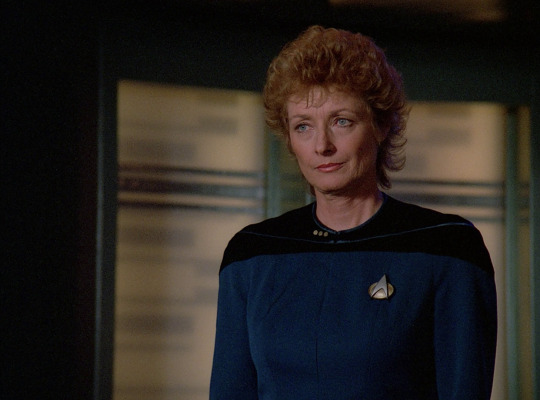
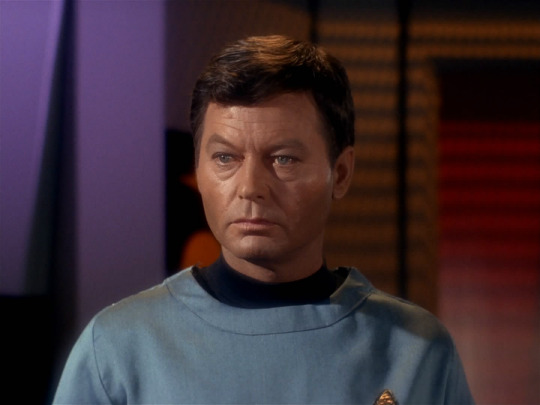
#1. She Is Essentially a Female Dr. McCoy… Sort Of: Pulaski was clearly heavily based on Dr. McCoy from TOS. She’s an middle-aged, somewhat world-weary doctor. She’s stubborn, grumpy, and doesn’t put up with anyone’s crap. She’s witty and always ready with a biting comment. She has the dedication to her job. She has the bantery relationship with the Science Officer, which we’ll go into that here soon. She is a doctor before she is an officer and that will always be her top priority, even at great risk to herself. She has a zero tolerance towards authority and isn’t afraid to talk back to anyone no matter how much they outrank her. She even outright has a hatred of teleporters that McCoy had. The parallels are all there. It may be why I’m a bit more lenient on her since McCoy is very much my favorite character in TOS and so far all of ST. But I think it is very much the root of the problem.
While Pulaski has several of McCoy’s traits, I think the writers really only understood McCoy on a surface level. They forget to include his compassion, his empathy, his humanism, his loyalty to the captain even when he opposes his actions, all of the things that make McCoy… well, McCoy. I don’t even know if the pacifism is there. Also McCoy had over 70 episodes of TOS and at that point five films (Undiscovered Country hadn’t been made yet). Pulaski had about 20 episodes and her relevance depended on the episode. McCoy had that as well, but he also had more material so we had FAR more time to get to know him. Pulaski didn’t get to have the time to gain that depth or care from the audience. Like… can I imagine Pulaski hypoing someone so that she can be tortured in their stead and it have the same impact that The Empath did? Can I see her counseling and assuring Picard if he’s having doubts like McCoy did for Kirk in The Ultimate Computer (okay tbf that would be Troi’s job but still)? Could I imagine any of the main cast being crushed about Pulaski dying of a terminal illness and choosing to stay on essentially a doomed spaceship with someone she just met and feel as gutted as I did in For the World is Hollow…? Honestly… given time maybe but in the end no. Now could I imagine McCoy risking getting an aging illness to possibly cure a child and others of it ala Unnatural Selection? Yes, albiet I think he’d be smart enough to bring protective equipment with him to be safe. Could I imagine McCoy telling someone like Data they’d be wrong to sit by a woman giving birth because he wasn’t human ala The Child? Hell no. Maybe he would if he was worried it would cause potential distress the one giving birth, but it sure as hell wouldn’t be because they’re an android. But I could imagine that someone who just saw McCoy as ‘grumpy doctor with a bad bedside manner who says witty lines and argues with the logical Vulcan character’ would get that interpretation. Thus why I think that Pulaski may have ended up how she did.
Now mind you I do think it IS a double standard to excuse McCoy’s dickish momemts and flaws, but demonize Pulaski for her’s. It’s like saying a man can be that way because it’s just expected of them and they can be forgiven, but a woman doing so or being assertice is wrong and they are horrible and unforgivable for having these traits or having flaws even if they correct them. That being said I do think that it’s more than that and it all comes down to the fact that TOS and TNG are two different shows with different character dynamics and ways of doing things. TOS mainly followed a Triumvirate (for the most part but that’s a different post entirely), TNG is much more of an ensemble. Pulaski didn’t have a Kirk nor a Spock to bounce off of or either let her traits shine or be kept in check like McCoy did nor did she really develop any unique relations for herself aside from maybe with Troi. We hear about her empathy and humanitarianism, but we don’t really see it on-screen like we did with McCoy. She has his surface level traits, not the deeper ones that the Triumvirate dynamic along his doctor position allowed him to showcase. In other words, Pulaski was put in a series that wasn’t designed for her while McCoy was exactly where he needed to be in order to thrive. It really speaks to how much the TNG writers didn’t really seem to get McCoy or why and how his character worked, which is strange since they got him right when he showed up in the series premiere. But maybe that was due to DeForest Kelley and him absolutely knowing the character he’d played for so long. But yeah they tried to replicate McCoy, and it just didn’t work with TNG’s already established character dynamics nor did they fully get the character that they were trying to recreate. If I want McCoy, I’ll go watch TOS or AOS. I didn’t need Pulaski for that.
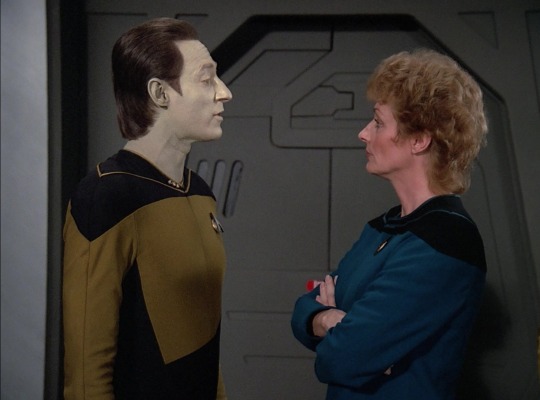
#2. Data and Misconstrued Character Dynamics; This is in relation to the first reason and REALLY shows how much the writers didn’t think the dynamics through. We all know how much Spock and McCoy bantered. How they are opposite ends of the spectrum and how their perspective points helped Kirk in making his decisions. Well clealry they wanted to re-create that with Pulaski and Data. Makes sense, Pulaski represents the humanism and Data the logical. But there’s one big, BIG problem with that: Data is NOT Spock. A lot fo people have pointed this out, but here’s the thing about Spock. Despite whatever he may have said, Spock DID have emotions. He kept them suppressed due to the issues in his upbringing and that wasn’t necessarily healthy, but he did have them. And despite speaking in a calm manner, he was also an utter sass bucket, could be rude, and had no issue putting down humanity if he had a point to make. He and McCoy were very much equal in their bantering and yes maybe McCoy could go too far with his insults, but there was always an equal balance and Spock was also perfectly capable of starting/escalating their spats. There were also plenty of moments to show that in spite of it, they were still friends and cared a great deal about each other with probably the best examples of this being The Immunity Syndrome, Bread and Circuses, The Empath, and plenty of moments in others like Miri and For the World is Hollow… Those who have been following me know how much I love the Spock/McCoy dynamic and I could go all day, but the point is it’s a complex relationship that may seem like disdain on the outside, but is so much more when you examine it up close.
Data however? Data is intelligent and the Science Officer with a calm demeanor, but that’s about where the similarity between him and Spock ends. Data is an android. I do not believe that he is emotionless, he just has a different wiring that causes him to feel things differently. He’s never shown disdain towards humanity at least from what I’ve observed thus far. If anything, he actively seeks to understand it and emotions more. He actively has hobbies like Sherlock Holmes. He tries things like sneezing and growing a beard in an effort to understand more. Data is more or less a child with a child-like understanding of things and he doesn’t really understand social cues or things like humor, but he DOES have emotions and feelings. There’s too much on-screen evidence to say otherwise. He just has his own way of processing it. This is what makes Pulaski look so bad. When she calls Data a machine, says he can’t understand, and even purposefully mispronounces his name, she comes across as an outright bully. She is essentially bullying a neurodivergent child. Do I need to explain why that’s awful? Data, while by no means a doormat, isn’t the type to sass back or make any biting comments back like Spock would. There is no balance. There is no equal footing. There are not enough positive interactions outside the banter to show that there is something deeper there at the end of the day like Spock and McCoy did. Heck you can even compare how Pulaski and McCoy talk to Data via McCoy’s guest appearance in Encounter at Farpoint. He DOES make a quip about Vulcans when talking to Data and when Data points out he’s an android not a Vulcan, McCoy mumbles “Just as bad.” But immediately after he gives Data genuine heartfelt advice on treating the Enterprise with care. It’s clear that ultimately it’s McCoy being his usual grumpy self who’d be acting the same way towards anyone else and is otherwise perfectly civil and encouraging to Data. We’ve known him long enough to know this. Pulaski didn’t have that luxury, coming off as condescending towards Data at best and considering that she’s a doctor, it looks especially bad.
Now to be fair this only lasts for about four episodes. Pulaski does start catching herself by her second episode, and stops completely after Unnatural Selection when Data helps her and stays with her after she gets the aging virus. After that she’s MUCH moe civil to him, even defending his choice going against the Prime Directive in Pen Pals and was at his retirement party in The Measure of a Man. But clearly the damage had been done. Data is a very beloved character and by Oulaski’s intro had already been established and well-liked character. Data was treated equally and was valued as far more than just an android among the rest of the crew, Crusher included, so Pulaski coming in a season later and acting that way also didn’t help. The writers did not think through why Spock and McCoy worked and how to try figure out a unique dynamic for Pulaski and Data. Instead they just tried to copy TOS, and it utterly failed. It ruined Pulaski’s chances before she could even really start running. But I do believe that she could have rebounded and as I said, she DID get past it. She did relapse some at the end of the season in Peak Performance to the point I wanna say that maybe it chronologically happened earlier in the season, but even then she felt realized her screw up and apologized. It’s still an improvement from early on. But things just weren’t meant to be, which leads is to…
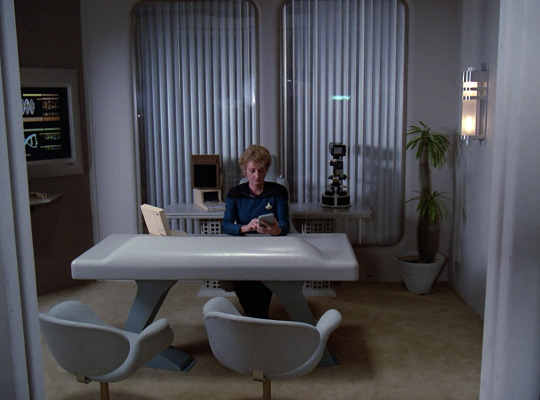
#3. She Only Lasted One Season/She Replaced Dr. Crusher: I believe that the biggest thing that worked against Pulaski is simple: she was cut after Season 2. Pulaski was created when Gates MacFadden left the show. I’ve seen conflicting reasons as to why, but regardless she left and a CMO was needed. IDK how popular Crusher was, but I had really enjoyed her. She was essentially the mom of the ship which added something different from TOS (wel McCoy was also the mom lets be real XD), had a son onboard which also added something new, was very much capable and devoted to her job, and was a badass when she got to use a phaser. Her being written out sucked, but that’s not necessarily a reason to hate Pulaski. But as I highlighted above, she just didn’t work. They tried to make McCoy, but without the dynamics and depth that let McCoy flourish. TNG is not TOS. Whenever TNG tried replicating TOS like with The Naked Now? It blew up in their faces. The key to a spinoff or reboot is to keep certain themes and tone alive, but to not just replicate what came before. TNG flourished when it began to find it’s own footing, and ultimately lasted four seasons longer than it’s predecessor due to it.
I genuinely believe that Pulaski COULD have developed into her own character and could have found her place the same way that McCoy did. But alas that didn’t happen. People wanted Crusher back, so they managed to get MacFadden to return and thus Crusher was put back in her rightful place. Because of it, Pulaski was just forgotten about. She didn’t get the chance to form her own character. She didn’t the chance to develop further and leave her early days behind. Why? Because she simply wasn’t given the opprotunity to do so. I can’t say it was the wrong choice, but it’s an utter shame because I do believe that Pulaski was on her way to improving. But it was too late. Her bad start with Data, her character not working in the TNG dynamic, and her replacing an already perfectly likeable character who did fit the dynamics all amounted to the character’s abrupt end. And because she didn’t get the chance to develop further and find her own path, her bad reputation has stuck to this very day.
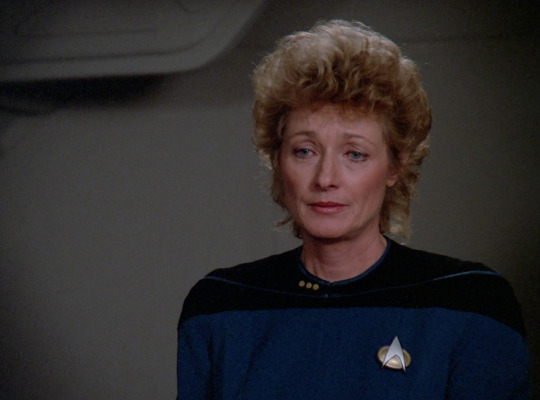
In the end, the whole thing just feels like a waste. Pulaski had potential, but it just didn’t work in the end. I can’t say that I hate her. If anything, I feel bad for her. The writers failed her at the end of the day and by the time they tried correcting their errors, the audience had already made their judgement. It may have been for the best to just drop her and bring Crusher back, but I also hate seeing character potential just so utterly wasted. I hope that if any side material used Pulaski, they were able to find a much better direction for her. I can’t say that I love Pulaski. In a more TOS-like setting maybe she’d have worked better. But in the end I think that Pulaski was a decent character who just had too much working against her and they caused her to crash and burn. Just an unfortunate case all in all.
(Image Source)
15 notes
·
View notes
Note
hi hi hello your pmv is absolutely amazing i adore it etc etc however i have said this already and !! please tell me about your journey with it i would love to know which parts are your favorite and which you struggled with and what you’re looking most forward to finishing n all that!!
bestie THANK YOU!! ..... when no one else got me i know tumblr user ginger starcloaked got me..... anyway im putting all the info under the cut but please indulge me i have so much to talk about
so! fun fact! this was only supposed to be the last 50 seconds of the song or so (from where the beat picks up). I was on one of my manic mal blum nights where i just listen to mal blum and i listened to archive on repeat 4 times and then like half and hour later while playing minecraft i said wait. ohoho i could do something here. cue me sketching out like half the thing in one night.
and THEN i got the worst burnout of my life and didn’t touch it for 8 weeks. until i was flying one day, and said to myself ‘hmm what if you. added a full minute to this 🤔’ and THEN cue me sketching out the extra minute for the following weeks. i have been thru so many different versions of this whole thing that there are only 7 frames that are the same as the original. so that’s fun
uhm so that’s all the general stuff out of the way let’s see... im just going to give general time stamps and if you wanna go look you can. im super partial to 0:25-0:43 AND the sequence from 1:43-1:48. that second sequence i’ve had a idea for since i started but i was so intimidated by it thst i only worked on it recently and i’m moderately proud of how it went. literally for so long i had a still frame there in my editing software and it just like. haunted me.
what did i struggle with hmmm. like so much. normally when i make a pmv or animatic it’s for a warriors character that i do not give a shit about and has no canon characterization so this was uh. a big change from that. i could say all the parts i struggled with but basically just look at any frame and assume i struggled with it <3 you’re probably right.
other than that time for me to give way too many fun facts about the extra details i put in! which will literally make sense to no one woohoo!
- 0:19-0:24, 0:43-0:48, 1:00-1:02, and 1:54 are all from s1e1 ‘Encounter at Farpoint’
-0:50-0:52 is from s1e6 ‘Where No One Has Gone Before’
Hey this is the part where I realize I didn’t use any scenes from Datalore but wow Datalore was fucked up on Wesley’s end huh.
-the statuette at 1:14 of Jack Crusher is one of the memorial statuettes that show up though out tng, though we never see one of Jack
-shots at 1:15-1:20 are from s5e6 ‘The Game’
-1:20 is the nova squadron 😞
-the ONE SECOND shot at 1:23 of wesley’s room is 90% interpolated from semi-canon information- there’s models of the Enterpirse-D and Apollo shuttle craft, which were confirmed in a guidebook, various awards and ribbons, and the very edge of the frame in the top left corner is based off one of the photos in Picard’s Ready Room
- the shots at 1:29-1:33 are from the epsiodes s4e5 ‘Remember Me’, s1e7 ‘Justice’, s3e26 ‘Best of Both Worlds’, s4e9 ‘Final Mission’, and the crash before s5e19 ‘The First Duty’
-the photo of Jack Crusher at 1:11 and 1:42 is never seen in show BUT is based off a photo of Wesley from a comic run (1989 issue #21) where everyone though he was dead 😔 RIP king
-1:44-1:50 is switching between the speech Picard gives Wes in ‘The First Duty’ and events from ‘Final Mission
-1:58 is from s2e17 ‘Samaritan Snare’
That’s all the tidbits I can think of rn I’ll add more as I think of them :] ALSO keep an eye out on the background color throughout, i had a lot of fun with that and there’s a lot of intent there.
6 notes
·
View notes
Text

h a p p y b i r t h d a y
John de Lancie
20 March 1948
🎈🎈🎈
[pic: de lancie as q, encounter at farpoint, tng]
#happy birthday#actor#john de lancie#born on this day#star trek#star trek the next generation#the next generation#gene roddenberry#star trek characters#tng character#Q#tng season 1#the next generation season 1#tng Encounter at Farpoint#Encounter at Farpoint#tng Encounter at Farpoint part 1#Encounter at Farpoint part 1#lot: st tng season 1 ep 1/26 (ep 1/178)
43 notes
·
View notes
Note
Hello! My sister and I will bringing our binge of TOS and the first six movies full circle soon. After she's caught up on Season 3 we'll cap it off with The Undiscovered Country before moving to the (mostly) uncharted waters of TNG. I hear only bad things about the first season(s) after the pilot. Is it worth enduring, or should we just skip ahead after" Encounter at Farpoint," and if so, how far?
So my experience with TNG was watching it beginning to end, without skipping. I honestly found the pilot a rough go - it was basically the first Star Trek I’d really watched - and I originally wasn’t super interested in continuing with the series. That would have been, depending on how you look at it, a real shame, or something that would have left me with a lot more free time! However, I think you do have to watch it, if only to properly appreciate the series finale.
I have a really tough time watching a show, even an episodic one, out of order, unless I have no other choice in the matter. Part of me wants to suggest you skip to Measure of a Man and then go back to the first season, but that also gives that episode less impact, as you haven’t spent nearly as much time with Data.
While Season 1 isn’t the greatest overall, it introduces a lot of characters that are important later (actually, a surprising number), and a lot of it is pretty campy fun, like The Big Goodbye or Datalore. I’d watch most of it, at least.
Code of Honor is pretty off-puttingly racist, and you might want to skip it either completely or at least for now, until you have a chance to like the series. You could watch it later as a cautionary tale, to critique. You can also skip Angel One, unless you want to see Riker in That Outfit. Justice is bad, but worth it for the campy experience. Too Short a Season, When the Bough Breaks, We’ll Always Have Paris, and The Neutral Zone (though the season finale) are, to me, just kind of boring.
Most of the other episodes have backstory or at least something that’s really useful to know before you proceed, and some I genuinely enjoy. And if you skip all of season one, Tasha Yar becomes kind of a mystery.
My recommendation would be to watch it, potentially skip the ones I’ve specifically mentioned (especially Code of Honor), but you might as well watch it all unless you’re feeling like you’re going to check out.
#star trek#star trek tng#asks#frustratedantiquarian#this is hard because i'm a completionist#but s1 introduces q and lwaxana and the traveler and the ferengi and lore and others#and has picard backstory and such#so it's hard for me to just say skip it#i was going to talk about all the episodes but i got tired forgive me my grades are due in friday
39 notes
·
View notes
Text
How to watch TNG
I’m part of a Star Trek discord and lately there seems to be a lot of people struggling to get through the first season of The Next Generation so here’s my advice on the best way to watch TNG.
1) Watch the premiere, “Encounter at Farpoint.” It’s not... great, but a bit of groundwork is necessary.
2) Watch season 2, episode 9, “The Measure of a Man.” It’s one of my favorite Trek episodes of all time and sets the bar high for the kind of show TNG can be when it is at its best. It centers around Data and grapples with the question of how exactly do we define personhood and decide who gets rights.
3) Watch the first episode of season 3 and keep watching through the end of the show’s 7th season.
4) By now you have hopefully built up enough love and goodwill for the show that you will be able to go back and watch the first two seasons without completely losing it.
5) Or just don’t watch the first two seasons at all or just cherry-pick episodes you’re interested in, it really doesn’t matter. There’s really no need to force yourself to watch something you don’t like and it doesn’t make you any less of a Trek fan.
6) Now watch Deep Space Nine <3
Happy Trekking!
33 notes
·
View notes
Note
which episodes would you recommend actually watching from s1? i'm planning to start watching tng soon
considering both the lore relevant ones and the quality factor i guess it would be:
episode 1 (encounter at farpoint) - because it is the pilot after all and its also pretty decent
episode 5 (where no one has gone before) - has relevant information for future seasons
episode 8 (the battle) - has relevant information on picard's past and is a nice episode overall. the ferengi were technically introduced on episode 4 but this episode works better as an introduction for the them and also doesn't suck
episode 12 (datalore) - for lore on data lmao
episode 18 (coming of age) - despite being wesley-centric, it's a nice episode and contains relevant information for a later episode
episode 19 (heart of glory) - worf episode that finally starts to explore how klingon society works on this series and worf's complicated relationship to it
episode 20 (the arsenal of freedom) - not plot relevant but a nice episode, i think. we get to see geordi in command of the enterprise so i could never skip that
episode 21 (symbiosis) - also technically skippable, but an emblematic episode to me. aside from the very unsubtle anti drugs messaging and the most after school PSA speech about it by tasha ever, this is the first episode that made me really question the federation's rules for the prime directive (something that gets later done on all of trek, so it's important)
episode 22 (skin of evil) - i really don't like this episode but it is very plot relevant so. unskippable.
episode 24 (conspiracy) - the one that connects to episode 18. pretty solid and plot relevant.
episode 25 (the neutral zone) - reintroduction of the romulans! the past episode works better as a season finale but this one is alright (even though I don't really like how they handle the other part of the plot)
as far as i remember, these are the really relevant ones from season 1. but i'd still recommend watching the whole thing if you can so you can form your own opinion. who knows, there's always an episode that's considered to bland by most that you can really like personally!
(just, if you do that, please don't watch episode 3 (code of honor). even the kindest fan cannot excuse that racist mess. main actors involved in it openly stated they were ashamed to be a part of it. it's trek at its most un-trek and it sucks)
#ask#again this is all on my opinion based on what i recall so idk take it for what it's worth#except code of honor. i'm not kidding that episode is unsalvageable on all levels#star trek
18 notes
·
View notes
Photo










Star Trek TNG SD & HD aka let’s experiment with this model pass in HD. I’ve used the same framerate and colouring for each. 1. Final Mission (S04E09) 2. Devil’s Due (S04E13) 3. Identify Crisis (S04E18) 4. I, Borg (S05E23) 5. The Inner Light (S05E25) The SD clearly show it’s two passes from the same model, one slowing and one constant. But we end up with two or three different interpretations for each for each of these passes.
The Inner Light was the first one to be released in HD as part of a sampler (along with Sins of the Father and Encounter at Farpoint IIRC) to get people interested in the upcoming releases. The colouring and detail work looks different than in Identity Crisis and I, Borg, which would make sense if they didn’t work on it until after The Inner Light was released.
But there’s a whole different interpretation of that pass for Final Mission and Devil’s Due, with some blur (more so than what shows in this gif unfortunately) and the impulse version the ship is going a bit lower.
#TNG#Star Trek#Star Trek: The Next Generation#USS Enterprise#GIF#my gifs#SD vs HD#sorry these older shots are imprinted in my brain#and this isn't a nitpick it's just a curious observation#possibly two different artists/teams#tngedit
88 notes
·
View notes
Text
If you’re new to Star Trek and want to watch every episode and film but don’t know where to start, here’s what I consider to be the best viewing order (the legend of series names is at the end of the post, and the years in which each section primarily takes place will be listed at the end of each line):
TOS Pilot The Cage (First Pilot, 2254)
TOS S1E3 Where No Man Has Gone Before (Second Pilot, 2265)
TOS S1E1-2 The Man Trap to Charlie X (2266)
TOS S1E4-S3E24 The Naked Time to Turnabout Intruder (series finale, 2266 - 2269)
TAS S1E1-S2E6 Beyond the Farthest Star to The Counter-Clock Incident (series finale, 2269 - 2270)
Star Trek: The Motion Picture (2273)
Star Trek II: The Wrath of Khan (2285)
Star Trek III: The Search for Spock (2285)
Star Trek IV: The Voyage Home (2286)
Star Trek V: The Final Frontier (2287)
Star Trek VI: The Undiscovered Country (2293)
TNG S1E1-S6E11 Encounter at Farpoint part 1 to Chain of Command part 2 (2364 - 2369)
DS9 S1E1-4 Emissary part 1 to A Man Alone (2369)
TNG S6E12-15 Ship in a Bottle to Tapestry (2369)
DS9 S1E5-8 Babel to Dax (2369)
TNG S6E16-S7E1 Birthright part 1 to Descent part 2 (2369 - 2370)
DS9 S1E9-20 The Passenger to In the Hands of the Prophets (2369)
TNG S7E2-13 Liaisons to Homeward (2370)
DS9 S2E1-12 The Homecoming to The Alternate (2370)
TNG S7E14-20 Sub Rosa to Journey’s End (2370)
DS9 S2E13-21 Armageddon Game to The Maquis part 2 (2370)
TNG S7E21-26 Firstborn to All Good Things part 2 (series finale, 2370)
DS9 S2E22-S3E8 The Wire to Meridian (2370 - 2371)
Star Trek: Generations (set in both 2293 and 2371)
DS9 S3E9-12 Defiant to Past Tense part 2 (2371)
VOY S1E1-16 Caretaker part 1 to Learning Curve (2371)
DS9 S3E13-26 Life Support to The Adversary (2371)
VOY S2E1-12 The 37s to Resistance (2371 - 2372)
DS9 S4E1-10 The Way of the Warrior part 1 to Our Man Bashir (2372)
VOY S2E13-S3E1 Prototype to Basics part 2 (2372 - 2373)
DS9 S4E11-26 Homefront to Broken Link (2372)
VOY S3E2-16 Flashback to Blood Fever (2373)
DS9 S5E1-13 Apocalypse Rising to For the Uniform (2373)
Star Trek: First Contact (2373)
VOY S3E17-S4E2 Unity to The Gift (2373 - 2374)
DS9 S5E14-26 In Purgatory’s Shadow to Call to Arms (2373)
VOY S4E3-9 Day of Honor to Year of Hell part 2 (2374)
DS9 S6E1-11 A Time to Stand to Waltz (2374)
VOY S4E10-26 Random Thoughts to Hope and Fear (2374)
DS9 S6E12-S7E9 Who Mourns for Morn? to Covenant (2374 - 2375)
VOY S5E1-9 Night to Thirty Days (2375)
Star Trek: Insurrection (2375)
DS9 S7E10-26 It’s Only a Paper Moon to What You Leave Behind (series finale, 2375)
VOY S5E10-S7E26 Counterpoint to Endgame part 2 (series finale, 2375 - 2378)
Star Trek: Nemesis (2379)
ENT S1E1-S4E22 Broken Bow part 1 to These Are the Voyages… (series finale, 2151 - 2155, final episode set in both 2161 and 2370)
Star Trek (2009 movie, set mostly in 2258 in an alternate timeline known as the Kelvin timeline)
Star Trek Into Darkness (2nd movie in the Kelvin timeline, in 2259)
Star Trek Beyond (3rd movie in the Kelvin timeline, in 2263)
DIS S1E1-15 The Vulcan Hello to Will You Take My Hand? (2256 - 2257, back in the Prime timeline)
ST S1E1-4 Runaway to The Escape Artist (set in different years between 2239 and an unknown date in the distant future)
DIS S2E1-14 Brother to Such Sweet Sorrow part 2 (2257 - 2258)
ST S2E1-6 Q&A to Children of Mars (likely series finale, set in different, mostly unconfirmed, years between the early 2230s and 2385)
PIC S1E1-10 Remembrance to Et in Arcadia Ego part 2 (2399)
DIS S3E1-13 That Hope Is You part 1 to That Hope Is You part 2 (3188 - 3189)
LD S1E1-S2E10 Second Contact to First First Contact (2380 - 2381)
PRO S1E1-10 Lost & Found part 1 to A Moral Star part 2 (2383 - 2384)
DIS S4E1-13 Kobayashi Maru to Coming Home (3190)
PIC S2E1-10 The Star Gazer to Farewell (2401)
SNW S1E1-10 Strange New Worlds to A Quality of Mercy (2259)
LD S3E1-10 Grounded to The Stars at Night (2381)
PRO S1E11-20 Asylum to Supernova part 2 (2384)
PIC S3E1-10 The Next Generation to The Last Generation (series finale, 2401)
SNW S2E1-10 The Broken Circle to Hegemony (2259)
LD S4E1-10 Twovix to Old Friends, New Planets (2381)
DIS S5E1-10 Red Directive to Life, Itself (series finale, 3191)
PRO S2E1-20 Into the Breach part 1 to Ouroboros part 2 (2384 - 2385)
LD S5E1-10 Dos Cerritos to The New Next Generation (series finale, 2382)
Star Trek: Section 31 (2324)
Legend:
TOS: The Original Series
TAS: The Animated Series
TNG: The Next Generation
DS9: Deep Space Nine
VOY: Voyager
ENT: Enterprise
DIS: Discovery
ST: Short Treks
PIC: Picard
LD: Lower Decks
PRO: Prodigy
SNW: Strange New Worlds
9 notes
·
View notes